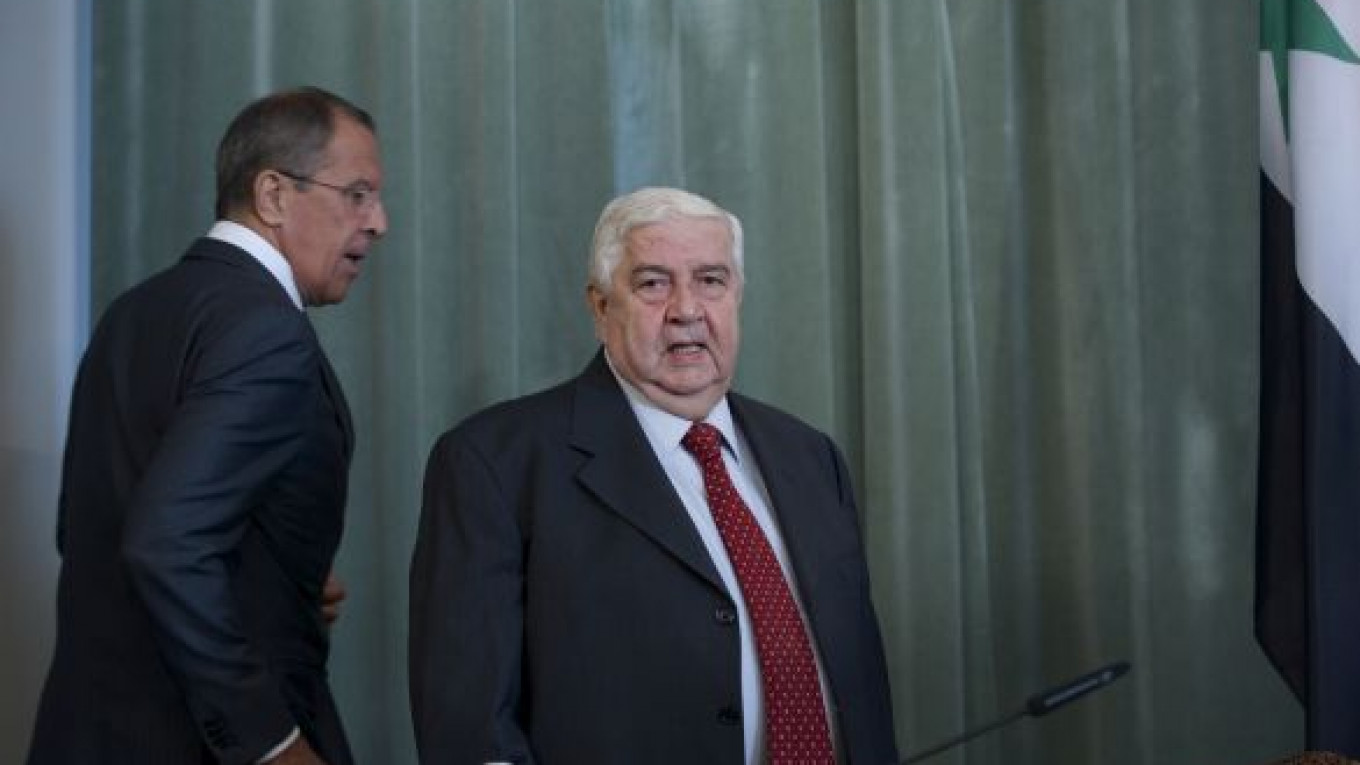Foreign Minister Sergei Lavrov said Monday that Moscow will push Syria to place its chemical weapons under international control.
Lavrov said that if such a move would help avert a possible U.S. strike on Syria, Russia would start work "immediately" to persuade Syria to relinquish control over its chemical arsenals.
He told reporters that Russia would urge Syria to concentrate its chemical weapons in certain areas under international oversight and then dismantle them.
At a news conference Monday, the Russian and Syrian foreign ministers strongly pushed for the return of United Nations inspectors to Syria to continue their probe into the use of chemical weapons and again warned Washington against launching an attack.
The statement comes as U.S. President Barack Obama, who blames Syrian President Bashar Assad for killing hundreds of his own people in a chemical attack last month, is pressing for a limited strike against the Syrian government. Assad has denied launching the attack, insisting along with its ally Russia that the attack was launched by the rebels to drag the U.S. into war.
Lavrov said after Monday's talks with his Syrian counterpart, Walid al-Moallem, that UN chemical weapons experts should complete their probe and present their findings to the UN Security Council.
"We have agreed to push for the soonest return of inspectors," Lavrov said.
Al-Moallem said his government was ready to host the UN team and insisted that Syria was ready to use all channels to convince the Americans that it was not behind the attack.
He added that Syria was ready for "full cooperation with Russia to remove any pretext for aggression."
Neither minister, however, offered any evidence to back their claim of rebel involvement in the chemical attack.
Lavrov said Russia would continue to promote a peaceful settlement and might try to convene a gathering of all Syrian opposition figures to join in negotiations. He added that a U.S. attack on Syria would deal a fatal blow to peace efforts.
Lavrov would not say how Russia could respond to a possible U.S. attack on Syria, saying that "we wouldn't like to proceed from a negative scenario and would primarily take efforts to prevent a military intervention."
President Vladimir Putin said Moscow would keep providing assistance to Syria in case of a U.S. attack, but he and other Russian officials have made clear that Russia has no intention to engage in hostilities.
Lavrov also denied allegations that Russia may have sponsored a deal between the U.S. and Syria during the Group of 20 summit in St. Petersburg last week, where Putin discussed the Syrian crisis with Obama.
"There won't be and there can't be any deal behind the back of the Syrian people," Lavrov said.
Separately on Monday, in Vienna, U.S.-Russian tensions over Syria spilled into a UN nuclear watchdog meeting when the two clashed over whether inspectors should analyze possible risks involved if a reactor near Damascus were to be hit during U.S.-led strikes.
Russia said last week that any military action against Syria's government could have catastrophic effects if a research reactor near the Syrian capital that contains radioactive uranium was struck "by design or by chance."
Russia's Foreign Ministry called on the International Atomic Energy Agency (IAEA) to urgently assess the issue with the U.S. preparing for punitive strikes in Syria over an alleged poison gas attack in its civil war.
But in a statement to an IAEA board of governors meeting Monday, where Moscow reiterated its demand, U.S. Ambassador Joseph Macmanus made Washington's objections clear.
"It is our view that requests for comprehensive risk analyses of hypothetical scenarios are beyond the IAEA's statutory authority," he said, according to a copy of his speech in the closed-door session.
The IAEA "must determine whether there is a scientific basis for conducting a highly speculative investigation of this kind," Macmanus added.
IAEA Director General Yukiya Amano said the UN agency was considering the Russian request, describing it as a "complicated issue" with technical, political as well as legal aspects.
Russia had asked for a quick response but Amano told a news conference: "I hope people understand that it takes time."
"The views are divided so far," he said about statements made on the issue by Russia, the U.S. and Cuba during the board meeting, which is due to end Friday and will also debate Iran and other topical nuclear matters.
Material from Reuters is included in this report.
A Message from The Moscow Times:
Dear readers,
We are facing unprecedented challenges. Russia's Prosecutor General's Office has designated The Moscow Times as an "undesirable" organization, criminalizing our work and putting our staff at risk of prosecution. This follows our earlier unjust labeling as a "foreign agent."
These actions are direct attempts to silence independent journalism in Russia. The authorities claim our work "discredits the decisions of the Russian leadership." We see things differently: we strive to provide accurate, unbiased reporting on Russia.
We, the journalists of The Moscow Times, refuse to be silenced. But to continue our work, we need your help.
Your support, no matter how small, makes a world of difference. If you can, please support us monthly starting from just $2. It's quick to set up, and every contribution makes a significant impact.
By supporting The Moscow Times, you're defending open, independent journalism in the face of repression. Thank you for standing with us.
Remind me later.






